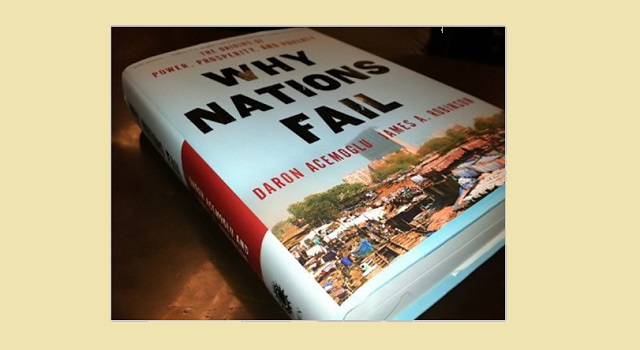
THE LAST WORD: How a book celebrated by the world’s leading economists is actually an intellectual absurdity
THE LAST WORD | Andrew M. Mwenda | Last Saturday, my intellectual friends and I held a thrilling debate on a book by James Robinson and Daron Acemoglu titled `Why Nations Fail’. The book became an instant bestseller when it was published. Five Nobel laureates in economics endorsed it. Four other economists I hold in high esteem did that same. Jarred Diamond, whose work on the role of geography in the economic prosperity got me thinking in 1998, said good things about it.
At our debate, Ramathan Goobi, an economist and lecturer at the Makerere Business School who has internalised the book made a good presentation of its core argument. It is hard to argue against so many Nobel laureates in economics and say they are mistaken or deluded. Yet this is what I am setting out to do.
The core argument of the book is that prosperity is entirely determined by institutions. Countries with “inclusive institutions” i.e. those what allow every citizen political rights which translate into economic freedom incentivise their citizens to be more productive. Countries with “extractive institutions” enrich a small clique of elites at the expense of the many.
The authors argue that it does not matter where a country is located geographically or its culture and initial endowments. As long as a country has inclusive institutions, it will prosper. To illustrate this point, they look at the differences in economic outcomes between North and South Korea. The two nations have same culture and geography. Yet their economic fortunes are entirely different. North Korea has per capital income (nominal) of $665 while South Korea has $27,800 i.e. 42 times richer.
On this basis, the authors conclude that geography and culture are irrelevant to prosperity. Chapter 13 is titled “Why nations fail today: institutions, institutions, institutions” to underline their core argument that seek ye first inclusive institutions and the rest will be added unto you.
There is no doubt that institutions are critical to economic prosperity. However, it is absurd to argue that they are all that matters. Institutions interact with many other factors like geography, culture, history, initial endowments (like human capita), timing etc. to produce prosperity. In other words (and to use a cliché) institutions are necessary but not a sufficient for prosperity.
The book is a study of income inequality. What led the authors to an absurd conclusion was that they made nations their unit of analysis. Had they looked at inequality generally – among regions, or ethnic groups or even individuals within the same country they would have realised the centrality of other factors.
Take the different states in the USA that are subject to the same inclusive institutions. The richest state in America in 2018 is Massachusetts with a per capita income of $65,545 while the poorest is Mississippi with a per capita income of $31,881. Why this difference?
First, let us assume that somehow, the institutions of Connecticut are more inclusive than those of Mississippi. Even within Connecticut itself, the different ethnic groups living there and facing the same institutions have Jews, whites and Asians richer than blacks and Hispanics.
One can argue that blacks and Hispanics are discriminated against hence their low-income levels. But even within black and Hispanic communities some individuals are richer than their co-ethnics. Among whites there are wealthy people like Bill Gates with a net worth of nearly $91 billion, and many other white people who sleep on the streets without any income at all.
Income inequality exits between nations but also within nations. And within nations it exits between certain regions of the same country and certain ethnicities within the same country or even between individuals in the same ethnic group. There are factors of history, culture, geography etc. that shape these inequalities between nations, regions, social groups and individuals. Institutions are only one such factor.
Let us return to the example of North and South Korea. The GDP of South Korea is 82 times larger than that of North Korea ($1.4 trillion versus $17 billion). But when one looks keenly at North Korea, one notices that they are able – in spite of sanctions, low levels of both GDP and GDP per capita – to achieve exceptionally high levels of technological sophistication.
 The Independent Uganda: You get the Truth we Pay the Price
The Independent Uganda: You get the Truth we Pay the Price




Mwenda, was it the intentions of the authors to write an “economic encyclopedia?” Maybe, it needed you first find out what their “problem statement” were, what their “literature review” were and probably you would be in a better position to pass on your judgement. The point I am raising is that they had to set a “scope of study” and theirs was “Why nations fail.” You could “expand” your “scope of study” to include the things you state here and that would give you the leverage to title your “study” differently. I mean the authors were not intended to write a “bible” or, the Quran for that matter, to include everything that one could have wished for. And I, don’t want to think for a moment that they are stating (in categorical terms) that other factors other than “inclusive institutions” are wrong but that it is “central.”
Nations in Africa fail mainly for the following reasons;
1.inadequate technology.
2.inadequate capital we need to borrow money for big projects like Dam constructtion,road construction from the 1st world.
3.Foreign interference for example;Uganda almost lost some development partners when she opposed of the Gay rights.
4.political instability which may not nessecairly be war alone but when government fails to honour some business agreements they have signed with investors for example,the case of Umeme,motor vehicle inspection.
5.lack of protection and support by both government and its citizens for local companies for example; why do Ugandans prefer MTN to Utl?
NO study can be ever exhaustive and sometimes even when a study has covered most of the ground, it may be overtaken by time.
The authors of the said book I am sure did not mean to imply that lack of institutions was the only obstacle, may be let alone the main one.
They did a study and were probably going by the principle of ” commonality”, where they looked at all or most of the nations that had failed to develop, and those that had and identified a common ” strain”, which in this case was ” institutions” , the presence or lack there of.
If one says for instance that disease(illness) is the cause of death, it does not mean that all death is caused by disease, just as all disease does not lead to death.
MWENDA tries to redefine the parameters of the book by bringing in the example of the American states.He sites the examples of MASSACHUSETTS and MISSISSIPPI where he states that one has an average per capita twice of the other.How then does CONNECTICUT come into the narrative. And besides , even if one has per capita twice the other, what are the comparative costs of living, especially say housing. AND , here , we are not dealing with one failed state against one that has not failed, we are dealing with a slightly more prosperous state with a less prosperous one(if you use per capita).
Between SOMALIA and DRC and SOUTH SUDAN, one is probably better off than the other/s, whatever measures you will have used, but they are all failed or almost failed states.
I have not read the book, and can not therefore comment on its contents, but I think MWENDA is taking the title of the book too literally. As a writer, he must be aware that titles and topics are most often ” sexed up” or sensationalized to make them more sellable and most times when you open the covers and read through, it does not come through as it is billed in the title.
Check out IQ and the Wealth of Nations by Richard Lynn and Tatu Vanhanen….also check out The Bell Curve by Richard J. Herrnstein and Charles Murray. IQ which is also related to long term culture, genetics and natural adaption (to environments) has a lot to do with economic development
Andrew, the authors of the book argue that the central factor in a nations transformation is the presence of good institutions. I do not think that they intended to suggest that other factors such as culture, geography or any other endowments are not crucial. Also fundamental to note is that good institutions help trigger the expansion and improvement of human resources, effectively exploit natural resources and endowments to a nations advantage, and most important rally the requisite financial investments required for a nation to transform(read from third world: The Singapore story first by Lee Kuan Yew). It is therefore not academically fair to suggest that the authors had no consideration of the very issues that institutions stand for.
MWENDAS is taking his desire to be a “non conformist” a bit too far.
I have seen many times M 9 trying to argue against convention.He at most times tries to put himself in a situation where he tries to argue against what others are saying or believe in, not because they are wrong, or that he is right, but just because he wants to. He has stated this by way of saying ” the majority is not always right” and that “common sense is not always common”, things which are very obvious.
Those who have carried out studies on people who behave and think like that have of course identified this as some form of complex.
Such people, when everybody says the sun rises from the east and sets in the west, will always come up with something different and argue their point til they drop dead.
M 9 , M 7 …………..!!!!!!!!!!
Brother Ejakait, How are you?
Just a light one! In our Senior 6 General Paper exam in 1977, there was a question almost exactly as you stated about the sun rising in the East and setting in the West. I thought I would go against the tide and argued almost otherwise: ‘That it has always risen in the east does not guarantee it will do so tomorrow or in future —‘ and I was actually right in some sense.
Well, the examiners at the time were not impressed I guess. But actually, it depends on whether one means East exactly or not because the sun does not rise in the exact east (or set in exact west) day in – day out unless you are located at the ‘exact’ equator. But even then, the wobbling of the earth spinning axis causes differences over long periods of time! In any case, beyond latitude 66.5 deg, the issue of sunrise or sunset hardly arises during parts of the year! So, my dear, it is possible for even those who think they ‘know’ – and hence – who load it – onto those ‘square pegs in round holes’ to be absolutely mistaken!
Cheers. Where is our Rwasubutare?
Dr Eng, nice to hear from you.
Hope all is well with you.
YES, our dear RWASUBUTARE has not been on for a while.
I hope and pray that he is well.